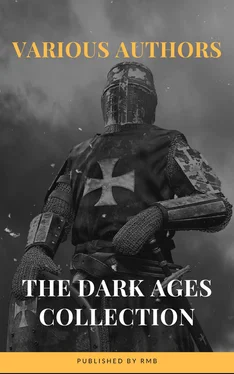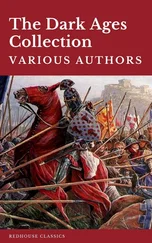The strong fortress of Asemus on the Danube, in Lower Moesia, 24won high praise for its valiant resistance to Hunnic squadrons, which separating from the main body had invaded Lower Moesia. They besieged Asemus, and the garrison so effectually harassed them by sallies that they were forced to retreat. A successful defence was not enough for the men of Asemus. Their scouts discovered the times when plundering bands were returning to the camp with spoils, and these moments were seized by the garrison, who unexpectedly assailed these small bodies of Huns and rescued many Roman prisoners.
The Imperial troops, which had been operating against the Persians and the Vandals, must have been available for operations against the Huns in A.D. 442 or 443, but it is not recorded that Aspar or Areobindus took the field when they returned from Persia and Sicily. We hear that a battle was fought in the Thracian Chersonese and that Attila was victorious, and after this a peace was negotiated by Anatolius (A.D. 443). The terms were humiliating for the Emperor. Henceforward the annual Hun-tribute of 700 lbs. of gold was to be trebled, and an additional payment of 6000 lbs. was to be made at once. All Hun deserters were to be surrendered to Attila, while Roman deserters were to be handed over to the Emperor for a payment of ten solidi a head.
Hitherto the realm of the Huns had been divided between the two brothers, Bleda and Attila. Of Bleda’s government and deeds we hear nothing. We may conjecture that he ruled in the east, from the Lower Danube to the Volga, and Attila in the west. Soon after the Peace of Anatolius, Attila found means to put Bleda to death and unite all the Huns and vassal peoples under his own sway. For the next nine years (A.D. 444-453) he was the most powerful man in Europe.
The Illyrian and Thracian provinces enjoyed a respite from invasion for three years. But in A.D. 447 the Huns appeared again south of the Danube. The provinces of Lower Moesia and Scythia, which had suffered less in the previous incursions, were now devastated. Marcianopolis was taken, and the Roman general Arnegisclus fell in a battle on the banks of the river Utus (Wid). At the same time, another host of the enemy descended the valley of the Vardar and advanced, it is said, to Thermopylae. 25Others approached Constantinople, and many of its inhabitants fled from it in terror. So we are told by a contemporary, who says that more than a hundred towns were taken, and that the monks and nuns in the monasteries near the capital were slain, if they had not already fled. 26
Attila was now in a position to enlarge his demands. A new peace was concluded (A.D. 448) by which a district, along the right bank of the Danube, extending from Singidunum eastward to Novae, and of a breadth of five days’ journey, should be left waste and uninhabited, as a march region between the two realms, and Naissus, which was now desolate, should mark the frontier. 27But Attila continued to vex the government at Constantinople with embassies, complaints, and demands, and as the drain on the treasury was becoming enormous, the eunuch Chrysaphius conceived the base idea of bribing an envoy of Attila to murder his master. Edecon, the principal minister of Attila, accepted the money and returned to his master’s residence, which was somewhere between the rivers Theiss and Körös, in company of a Roman embassy the head of which was Maximin. But the plot was revealed to Attila. He respected the person of the ambassador, but he sent to Constantinople Orestes (a Roman provincial of Pannonia who served him as secretary) with the bag which had held the bribe tied round his neck, and ordered him to ask Chrysaphius in the Emperor’s presence whether he recognised it. The punishment of the eunuch was to be demanded. The Emperor then sent two men of patrician rank, Anatolius (Master of Soldiers in praesenti ) and Nomus (formerly Master of Offices), to pacify the anger of the Hun. Attila treated them haughtily at first, but then showed surprising magnanimity and no longer insisted on the punishment of Chrysaphius. He promised to observe the treaty and not to cross the Danube (A.D. 449-450).
Until the end of the reign of Theodosius the oppressive Hun-money was paid to Attila, but, as we saw, Marcian refused to pay it any longer. It seemed that the Illyrian provinces would again be trampled under the horse-hoofs of the Hun cavalry, though little spoil can have been left to take. But Attila turned his eyes westward, where there was hope of richer plunder, and the realm of Valentinian, not that of Marcian, was now to be exposed to the fury of the destroyer.
§ 3. The Empire and Court of Attila
Under the rule of Rugila and Attila the Hunnic empire had assumed an imposing size and seemed a formidable power. The extent of Attila’s dominion has doubtless been exaggerated, but his sway was effective in the lands (to use modern names) of Austria, Hungary, Roumania, and Southern Russia. How far northward it may have reached cannot be decided. The most important of the German peoples who were subject to Attila were the Gepids (apparently in the mountainous regions of northern Dacia), 28the Ostrogoths (who had migrated westward from their old homes on the Euxine), 29and the Rugians (somewhere near the Theiss) 30— all in the neighbourhood of the lands where the Huns themselves had settled. The Gepid king, Ardaric, was Attila’s most trusted counsellor, and next to him, Walamir, one of the Ostrogothic kings. On these peoples he could rely in his military enterprises. Before A.D. 440 the Huns had made an incursion into the Persian empire, and such was the prestige of their arms and Attila’s power eight years later that the Roman officers talked of the chances of the overthrow of Persia and the possible consequences of such an event for the Roman world.
Attila indeed looked upon himself as overlord of all Europe, including the Roman Empire. Theodosius paid him a huge sum yearly, Valentinian paid him gold too; were they not then his tributaries and slaves? He dreamed of an empire reaching to the islands of the Ocean, 31and he was soon to make an attempt to extend it actually to the shores of the Atlantic. 32In his dealings with the Empire he had one great military advantage. We have already seen how the Imperial government depended on the Huns and on the Germans beyond the frontier for the recruiting of its armies. Without his Hunnic auxiliaries Aetius would hardly have been able to save as much of Gaul as he succeeded in saving from the rapacity of the German settlers. Attila was in a position to stop these sources of supply. He could refuse to send Hunnic contingents to help the Romans again their enemies; he could forbid individual Huns to leave their country and enter Roman service; and he could bring pressure to bear on his vassal German kings to issue a similar prohibition to their subjects. That he was fully conscious of this power and made it a feature of his policy, is shown by his stern insistence, in negotiating with Theodosius, that all Hun deserters should be surrendered; perhaps by the device of keeping a strip of neutral territory south of the Danube in order to make it more difficult for his own subjects to pass into the Roman provinces; and particularly by the fact that when his empire was broken up after his death, the empire was inundated by Germans seeking to make their fortunes in Roman service.
Since their entry into Europe the Huns had changed in some important ways their life and institutions. They were still a pastoral people, they did not learn to practise tillage, but on the Danube and the Theiss the nomadic habits of the Asiatic steppes were no longer appropriate or necessary. And when they became a political power and had dealings with the Roman Empire — dealings in which diplomacy was required as well as the sword — they found themselves compelled to adapt themselves, however crudely, to the habits of more civilised communities. Attila found that a private secretary who knew Latin was indispensable, and Roman subjects were hired to fill the post. But the most notable fact in the history of the Huns at this period is the ascendancy which their German subjects appear to have gained over them. The most telling sign of this influence is the curious circumstance that some of their kings were called by German names. The names of Rugila , 33 Mundiuch (Attila’s father), and Attila are German or Germanised. This fact clearly points to intermarriages, but it is also an unconscious acknowledgment of the Huns that their vassals were higher in the scale of civilisation. If the political situation had remained unchanged for another fifty years the Asiatic invader would probably have been as thoroughly Teutonised as the Alans, whom the Romans had now come to class among the Germanic peoples. 34
Читать дальше












